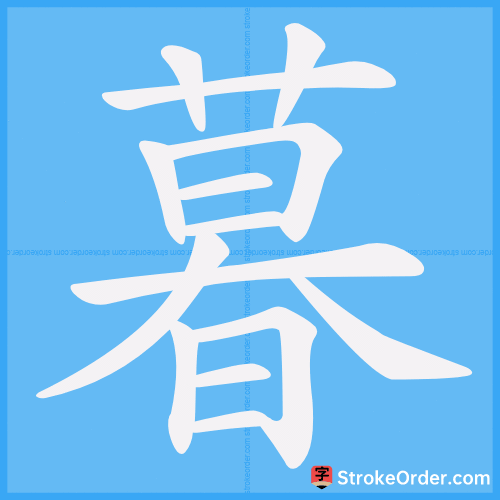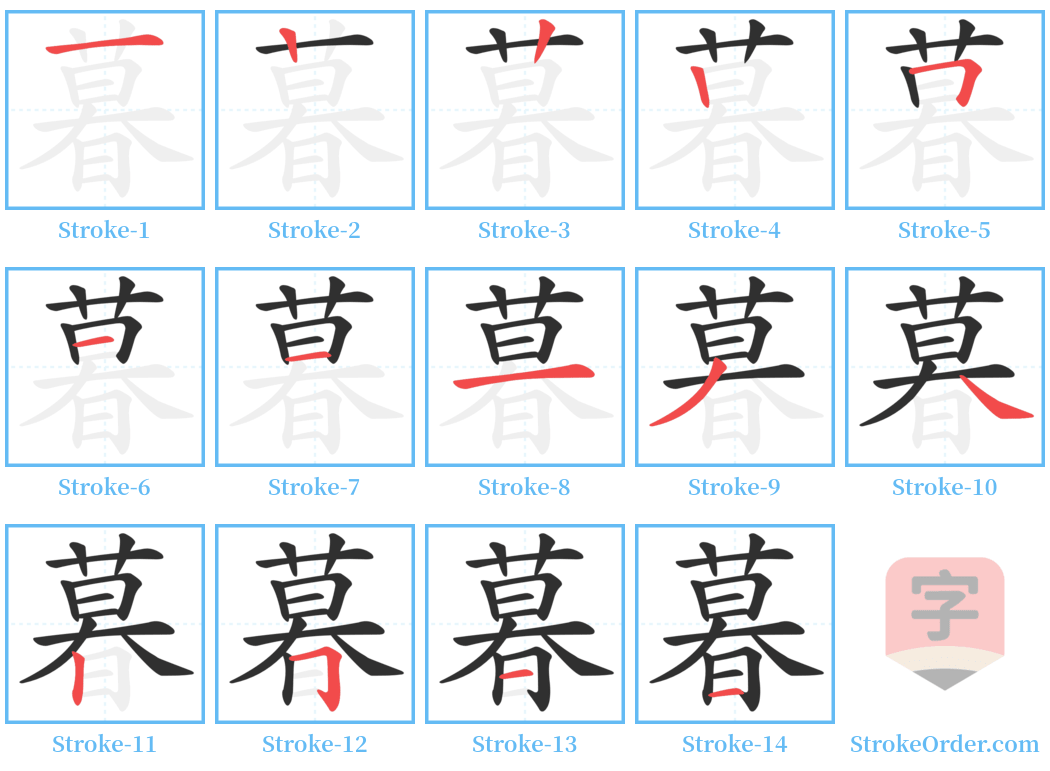暮 Stroke Order
Animated Stroke Order of 暮

Stroke Order Diagrams for 暮

Step-by-Step Handwriting Guide for 暮

Learn to Write Chinese Characters with Video Tutorials
Watch the video of writing the Chinese character "暮", learn the correct stroke order (笔顺) of the character "暮", and master the standard way of writing the character "暮".
Free Printable Handwriting Practice with Stroke Order: 暮
Printable Writing Practice Worksheet of "暮" in Portrait Orientation (Tian Zi Ge)

Printable Writing Practice Worksheet of "暮" in Landscape Orientation (Tian Zi Ge)

Information of 暮
Pinyin
mù
Radical
日
Strokes
14 strokes
Usage
★★★★★
Definition
evening / sunset
暮 [mù]
1. Dusk; sunset; evening.
- 傍晚,太阳落山的时候。
(Evening, the time when the sun sets.)
- 日~。
(Dusk.)
- ~气。
(Evening atmosphere.)
- ~色。
(Evening colors.)
- 日~途穷。
(The end of the day.)
- ~鼓晨钟。
(Evening drum and morning bell.)
2. Late; nearing the end.
- 晚,将尽。
(Late, approaching the end.)
- ~春。
(Late spring.)
- ~年。
(The end of the year.)
- ~节。
(The end of the season.)
- ~齿(晚年)。
(Old age.)
3. Aged.
- 喻指年老,衰老。
(Refers to being old, aging.)
4. Late towards the end of.
- 迟;晚。
(Late; towards the end of.)
引 ("Quotes"):
1. 《论衡·明雩》: "暮者,晚也。"
(Dusk means late.)
2. 《庄子·齐物论》: "朝三而暮四。"
(In the morning three, in the evening four.)
3. 《楚辞·离骚》: "恐美人之迟暮。"
(Fearful of the beauty's late years.)
4. 《乐府诗集·木兰诗》: "旦辞爷娘去,暮宿黄河边。"
(Departing from parents at dawn and lodging by the Yellow River at dusk.)
5. 《韩非子·难一》: "今朝至,暮变。"
(Arriving today, changing by dusk.)
6. 宋· 苏轼《石钟山记》: "至莫夜月光明。"
(Reaching the night when moonlight is bright.)
7. 唐· 杜甫《石壕吏》: "暮投石壕村,有吏夜捉人。"
(At dusk he entered the village of Shigao, where officials caught people at night.)
例 ("Examples"):
- 暮天 (Evening sky)
- 暮雨 (Evening rain)
- 暮途 (Evening journey)
- 暮烟 (Evening haze)
- 暮暮 (Every evening)
- 暮鼓 (The drum sound that marks evening)
- 暮暗 (Dusk when it gets dark)
引 ("Quotes"):
1. 沈约《桐赋》: "枝封暮雪。"
(Branches covered by evening snow.)
2. 《论语》: "暮春者,春服既成,冠者五六人。"
(At the end of spring, spring clothing is already made, with five or six wearing crowns.)
例 ("Examples"):
- 暮月 (The last month of a season)
- 暮末 (The end times)
- 暮冬 (The end of winter)
形 (Adjective):
1. Aged.
- 辄指年老、衰老。
(Refers to being old, aging.)
引 ("Quotes"):
1. 庾信《哀江南赋序》: "藐是流离,至于暮齿。"
(This fleeting life, until old age.)
例 ("Examples"):
- 暮老 (Referring to being old)
- 暮古 (Old and confused)
- 暮志 (Aspirations in old age)
- 暮耋 (Referring to old age)
- 暮齿 (Old age)
- 暮景 (Metaphor for the twilight years of life)
2. Late; towards the end of.
引 ("Quotes"):
1. 《吕氏春秋》: "夫自念斯,学德未暮。"
(Contemplating this, studying virtue has not yet ended.)
2. 曹操《步出夏门行》: "烈士暮年,壮心不已。"
(In late years, a hero's ambitions do not wither.)
例 ("Examples"):
- 暮迟 (Not timely)
- 暮生 (Born after the father’s death)
lit. evening drum, morning bell (idiom); fig. Buddhist monastic practice / the passage of time in a disciplined existence
lit. say three in the morning but four in the evening (idiom); to change sth that is already settled upon / indecisive / to blow hot and cold
Input Method for 暮
Pinyin
mu4
Wubi
ajdj
Cangjie
taka
Zhengma
ekgk
Four Corner
44608
Unicode
U+66ae
Same Pronunciation Characters